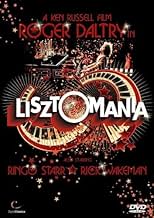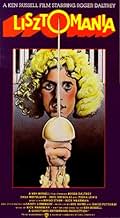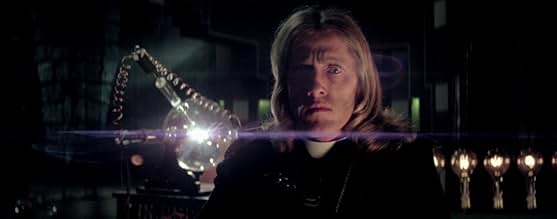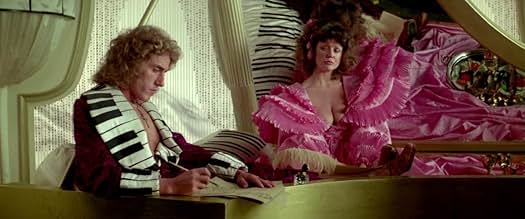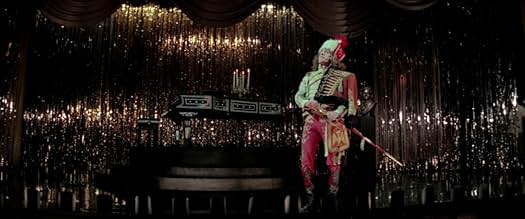VALUTAZIONE IMDb
6,1/10
3278
LA TUA VALUTAZIONE
La vita e soprattutto gli amori del compositore ungherese Franz Liszt, raccontati nei termini di un moderno musicista rock.La vita e soprattutto gli amori del compositore ungherese Franz Liszt, raccontati nei termini di un moderno musicista rock.La vita e soprattutto gli amori del compositore ungherese Franz Liszt, raccontati nei termini di un moderno musicista rock.
- Regia
- Sceneggiatura
- Star
Recensioni in evidenza
The real-life Franz Liszt had an incredibly bizarre life, with plenty of erotic encounters. He also wrote gorgeous music. This should have been a great movie.
Unfortunately, Ken Russell goes even more nuts than usual with his Ken Russellisms. Gratuitous breasts? Check. Sparkly crosses? Check. Sexy nuns? Check. Phallic symbols? Check. Adolescent girl behaving shockingly? Check. The only thing missing is the water that usually gushes symbolically through his pictures.
Roger Daltrey comes off as a complete idiot in interviews, yet gives incredible performances in everything from Pete Townshend to William Shakespeare. He tries to save Lisztomania with his acting (he can go from farce to high drama easily)and his good looks (though he's gorgeous with his signature curls straightened, why exactly DOES his hair get straighter as the film progresses?)
Many of the supporting actors help a bit, too, including a tiny but memorable, pre-Rocky Horror scene from Little Nell.
I've seen Tommy many times, but I don't think I'll ever watch Lisztomania more than once. However, I'm not sorry I saw it. I would love to own the soundtrack--Liszt and Wagner sound terrific redone as 70's guitar-rock.
At a mere 103 minutes, there is too much padding. I recommend that people watch as I did, with a hand on the fast-forward of your remote.
Lisztomania is too mired in its own coolness and allegory. Many scenes start out promisingly, and many of the visuals are shocking or impressive at first, but then the scenes go onnnn and onnnn...
Unfortunately, Ken Russell goes even more nuts than usual with his Ken Russellisms. Gratuitous breasts? Check. Sparkly crosses? Check. Sexy nuns? Check. Phallic symbols? Check. Adolescent girl behaving shockingly? Check. The only thing missing is the water that usually gushes symbolically through his pictures.
Roger Daltrey comes off as a complete idiot in interviews, yet gives incredible performances in everything from Pete Townshend to William Shakespeare. He tries to save Lisztomania with his acting (he can go from farce to high drama easily)and his good looks (though he's gorgeous with his signature curls straightened, why exactly DOES his hair get straighter as the film progresses?)
Many of the supporting actors help a bit, too, including a tiny but memorable, pre-Rocky Horror scene from Little Nell.
I've seen Tommy many times, but I don't think I'll ever watch Lisztomania more than once. However, I'm not sorry I saw it. I would love to own the soundtrack--Liszt and Wagner sound terrific redone as 70's guitar-rock.
At a mere 103 minutes, there is too much padding. I recommend that people watch as I did, with a hand on the fast-forward of your remote.
Lisztomania is too mired in its own coolness and allegory. Many scenes start out promisingly, and many of the visuals are shocking or impressive at first, but then the scenes go onnnn and onnnn...
19th century castration fantasy--delineating the extravagance of Hungarian composer Franz Liszt's sex-saturated young life until his eventual death by the symbolic stabbing of a voodoo needle (a myriad of maladies in actual life)--done-up in the spirit of a naughty British schoolboy bored by his classical lessons and entertaining himself by looking up his music teacher's skirts. Writer-director Ken Russell's cartoon-strip nightmare begins promisingly, with a hilarious slapstick joust between Liszt and his lover's husband, the Count d'Agoult (it's a naked swashbuckler, like something from an inventive blue movie). But soon it becomes apparent that Russell's vision is going to be all a pastiche, from silent movies to "Frankenstein" to German Expressionism to bows of unassuming self-reverence. The surreality of Russell's concept doesn't even make sense in the mad forum he has created--there's a narrative thread, yet nothing hangs together--while the creative production design upstages most of the actors. *1/2 from ****
Franz Liszt (Roger Daltrey) is a hedonistic composer in old Europe. In real life, the Hungarian musician lived from 1811 to 1886. Richard Wagner is a music associate. Ringo Starr plays The Pope.
This is surrealistic biopic. It can be seen as a mess, self-indulgent, and undecipherable. It can also be seen as intriguing and challenging. I choose to see it as the later. It's definitively not safe. I prefer a mess more than an uninteresting bland biopic. As an actor, Daltrey is not that great but his rock star personality is undeniable. Ken Russell is throwing a lot into this. It's a lot and it runs a bit long. I wish it wraps up a little sooner. Wagner needs to have more scenes as the antagonist. I would also like a bigger better actor playing him. He doesn't have to be a real musician. All in all, this is at least interesting.
This is surrealistic biopic. It can be seen as a mess, self-indulgent, and undecipherable. It can also be seen as intriguing and challenging. I choose to see it as the later. It's definitively not safe. I prefer a mess more than an uninteresting bland biopic. As an actor, Daltrey is not that great but his rock star personality is undeniable. Ken Russell is throwing a lot into this. It's a lot and it runs a bit long. I wish it wraps up a little sooner. Wagner needs to have more scenes as the antagonist. I would also like a bigger better actor playing him. He doesn't have to be a real musician. All in all, this is at least interesting.
To many, this film is the stunning-proof that director Ken Russell never had it, and that idiocy and egotism were mistaken for genius. You could say mistaking idiocy and egotism for genius has been the appeal of rock music! Others might say that Russell is simply childish or immature, and that his films are the "masturbatory-fantasies" of an overgrown-adolescent. This belief is unfounded. Is this film over-indulgent? Yes it is, dear readers, very-much-so, because it is art, not entertainment. That-said, if you chuck any expectations, this is a funny film and allegory about the rise of pop-culture in the 19th Century. It draws parallels between Liszt's fame with the other generally-hollow spectacle known as "rock." This is great film-making, and it should be noted that it has similarities between itself and "Rocky Horror," and even "Hedwig and the Angry Inch," as they all examine and explore the relationships between sexuality and pop-culture in similar-areas. It really is true that women threw their underwear at Franz Liszt during his performances, and that he had many-many lovers--groupies.
Lisztomania is an odd bridge-between "classic" rock and the emergent punk-movement of the time. The film can also be seen as a statement that "rock" is not really subversive or rebellious at-all, but ultimately arch-conservative, and repressive. Amen. It's just a hilarious, wild-romp that will make your guests extremely nervous, which films should do. Movies should challenge people to think and reflect--at-least occasionally. Ironically (or maybe-not!), Mr. Russell had contracted Malcolm MacLaren and Vivienne Westwood to design the S&M-costumes for his film, "Mahler." It should also-be-noted that "Liszt-o-Mania" was released exactly the same year that MacLaren's shop "SEX" opened on King's Row, the rest is as they say, is history. It couldn't be more camp, it has Little Nell in it.
Basically-put, this is about the the ins-and-outs of "why" we want and need pop-culture, and WHAT we generally-want from our "pop-idols" (sex, of-course). One could easily-say this film criticizes the absurd spectacle that rock had become by 1975, and we get this quite-often in the film. But this theme goes much-deeper, into the relationship-between artist and patron (once, just the aristocracy, now the mob is added). The sexuality is about mass-psychology, too, so Wilhelm Reich gets-his-due, and there is a plethora of Freudian-imagery. It is certainly a very-personal film for Russell, and probably amuses him as much as it does myself that it enrages so-many critics, but it should be noted that some of the absurdity and excess came from the producer of the film, not Mr. Russell. Ken Rusell enrages all the right-people, and that's what some film-making should be.
God love this lapsed-Catholic, and God love his ways. A flawed part of his canon, but very watchable and educational. As Russell began his career doing documentaries and impressionistic-films on composers for the BBC, it makes-sense that this is considered one of his most heretical-works. He complains about the opening country-song in his autobiography 'Altered States', and there were other aspects of the production he didn't want in the film. It's interesting to note that the 1980s was the period of his purest-work, due mainly to a three-picture-deal with Vestron. The 1970s were actually a very mixed-bag for him, as Lisztomania attests. He isn't entirely-pleased with it, but had some fun with the material, and there it is. I think it's a hoot, which means it isn't on DVD.
Lisztomania is an odd bridge-between "classic" rock and the emergent punk-movement of the time. The film can also be seen as a statement that "rock" is not really subversive or rebellious at-all, but ultimately arch-conservative, and repressive. Amen. It's just a hilarious, wild-romp that will make your guests extremely nervous, which films should do. Movies should challenge people to think and reflect--at-least occasionally. Ironically (or maybe-not!), Mr. Russell had contracted Malcolm MacLaren and Vivienne Westwood to design the S&M-costumes for his film, "Mahler." It should also-be-noted that "Liszt-o-Mania" was released exactly the same year that MacLaren's shop "SEX" opened on King's Row, the rest is as they say, is history. It couldn't be more camp, it has Little Nell in it.
Basically-put, this is about the the ins-and-outs of "why" we want and need pop-culture, and WHAT we generally-want from our "pop-idols" (sex, of-course). One could easily-say this film criticizes the absurd spectacle that rock had become by 1975, and we get this quite-often in the film. But this theme goes much-deeper, into the relationship-between artist and patron (once, just the aristocracy, now the mob is added). The sexuality is about mass-psychology, too, so Wilhelm Reich gets-his-due, and there is a plethora of Freudian-imagery. It is certainly a very-personal film for Russell, and probably amuses him as much as it does myself that it enrages so-many critics, but it should be noted that some of the absurdity and excess came from the producer of the film, not Mr. Russell. Ken Rusell enrages all the right-people, and that's what some film-making should be.
God love this lapsed-Catholic, and God love his ways. A flawed part of his canon, but very watchable and educational. As Russell began his career doing documentaries and impressionistic-films on composers for the BBC, it makes-sense that this is considered one of his most heretical-works. He complains about the opening country-song in his autobiography 'Altered States', and there were other aspects of the production he didn't want in the film. It's interesting to note that the 1980s was the period of his purest-work, due mainly to a three-picture-deal with Vestron. The 1970s were actually a very mixed-bag for him, as Lisztomania attests. He isn't entirely-pleased with it, but had some fun with the material, and there it is. I think it's a hoot, which means it isn't on DVD.
The film suffers from atrocious vulgarization in very bad style and taste throughout, which is a pity, because the idea is not bad at all. Liszt and Wagner are portrayed in gross caricature, which they were already while they were alive and kicking, and just like the 19th century caricatures even these modern ones do not miss their target and actually pinpoint some obvious truths about these the greatest divas among composers in monstrous vanity and atrocious hubris. Liszt was the more sympathetic and actually fell a prey and victim to the ruthlessness of Wagner ending up as a trophy in his graveyard, while the depicting of Wagner as a vampire and prelude to Hitler, his Frankenstein monster, is not altogether maladroit. In certain aspects it actually hits the nail. The unnecessary hooliganism of the film is the corruption of the music, which really is very little Liszt and Wagner but the more Rick Wakeman in horrible disfigurement in pop and rock versions. This is not a music film or any kind of biography or documentation of great composers but rather a twisted parasitic phantasmagoria tearing classical music apart and more or less destroying it. Ringo Starr as a pope with Liverpool accent doesn't make things any better. It isn't even funny but only stupid and disgusting. although a few laughs must out. Still, because of the idea, the imagination, the great camera work and the brilliant fireworks entertainment, I have to give it 5, which is the lowest I ever rated a film here, and I am very doubtful whether I will see any other of Ken Russell's films on music, no matter how much I appreciated his "Valentino".
Lo sapevi?
- QuizFirst movie to be encoded with a Dolby Stereo optical soundtrack.
- BlooperDuring the flashback when Liszt is notating the music for Dream of Love; on the second page in the first measure there is the note E-Flat written as an E with the flat symbol next to it. However, since the song is already in the key of A-Flat which includes E-Flat in the scale, it is not necessary to notate the Flat symbol next to the E note. This is only done if the previous E-note was notated as an E-Natural and even then the flat symbol would be placed in parenthesis.
- ConnessioniFeatured in Hollywood Singing & Dancing: A Musical History - 1970's (2009)
- Colonne sonoreRienzi/ Chopsticks Fantasia
Composed by Richard Wagner and Franz Liszt
I più visti
Accedi per valutare e creare un elenco di titoli salvati per ottenere consigli personalizzati
- How long is Lisztomania?Powered by Alexa
Dettagli
- Data di uscita
- Paese di origine
- Lingua
- Celebre anche come
- Litzomania
- Luoghi delle riprese
- Aziende produttrici
- Vedi altri crediti dell’azienda su IMDbPro
- Tempo di esecuzione1 ora 43 minuti
- Mix di suoni
- Proporzioni
- 2.35 : 1
Contribuisci a questa pagina
Suggerisci una modifica o aggiungi i contenuti mancanti

Divario superiore
By what name was Lisztomania (1975) officially released in India in English?
Rispondi

